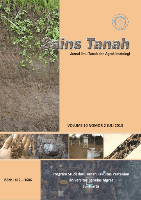
SAINS TANAH
Scope & Guideline
Promoting Innovative Solutions in Soil Health and Agriculture
Introduction
Aims and Scopes
- Soil Fertility and Nutrient Management:
Research exploring soil fertility, nutrient availability, and the impact of fertilizers (both organic and inorganic) on crop yield and soil properties. - Soil and Water Management:
Studies focusing on irrigation practices, water demand, and the influence of soil conditions on water retention and use in agricultural settings. - Environmental Impact and Soil Conservation:
Investigations into soil conservation techniques, erosion control, and the effects of land use changes on soil health and environmental sustainability. - Soil Microbiology and Biochemistry:
Research on the role of soil microorganisms in nutrient cycling, plant growth promotion, and soil health, including the use of biofertilizers. - Soil Amendments and Remediation:
Exploration of various soil amendments (e.g., biochar, compost) and their effects on soil quality, carbon sequestration, and pollution remediation. - Land Suitability and Agricultural Practices:
Assessment of land suitability for various crops based on soil characteristics, and studies on innovative agricultural practices that improve soil and crop productivity.
Trending and Emerging
- Sustainable Agriculture Practices:
A significant increase in research focused on sustainable agricultural practices, including organic farming, agroecology, and integrated nutrient management, highlighting the need for environmentally friendly approaches. - Impact of Climate Change on Soil:
Emerging studies examining how climate change affects soil properties, crop yields, and agricultural practices, underlining the importance of resilience in soil management. - Technological Innovations in Soil Science:
Growing interest in the application of technology, such as UAVs and remote sensing, for soil monitoring and management, reflecting the integration of modern techniques in traditional soil science. - Soil Health and Ecosystem Services:
An increasing trend in research exploring the relationship between soil health and ecosystem services, such as carbon sequestration and biodiversity, emphasizing the multifunctional role of soils. - Biofertilizers and Soil Microbial Dynamics:
A rise in studies focusing on biofertilizers and the dynamics of soil microorganisms, illustrating a shift towards understanding the biological aspects of soil fertility and plant growth.
Declining or Waning
- Heavy Metal Contamination Studies:
Research specifically targeting heavy metal contamination in soils has decreased, possibly indicating a shift towards broader environmental health topics or alternative contaminant assessments. - Traditional Soil Classification Methods:
There has been a waning interest in traditional soil classification systems, with more emphasis now on integrated approaches that consider multiple factors affecting soil health. - Conventional Agricultural Practices:
Papers focusing solely on conventional agricultural practices without considering sustainable alternatives have become less common, reflecting a broader trend towards sustainable agriculture. - Single Crop Studies:
Research that centers exclusively on single crops without integrating multi-crop or agroecological perspectives has seen a decline, as the focus shifts towards systems-based approaches for sustainability.
Similar Journals
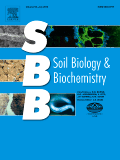
SOIL BIOLOGY & BIOCHEMISTRY
Elevating Soil Science to New HeightsSOIL BIOLOGY & BIOCHEMISTRY, published by Pergamon-Elsevier Science Ltd, is a premier academic journal that plays a pivotal role in advancing the fields of microbiology and soil science. Established in 1969, this esteemed journal has gained recognition for its rigorous publication standards and impactful research contributions, evidenced by its prestigious Q1 rankings in both Microbiology and Soil Science categories for 2023. With an impressive Scopus rank of #3 among 159 in Agricultural and Biological Sciences and #14 among 182 in Immunology and Microbiology, it boasts a notable 98th percentile in its field. The journal offers researchers, professionals, and students a vital platform for sharing innovative studies and insights about soil ecosystems and their biochemical processes, fostering greater understanding and collaboration within the scientific community. While Open Access options are currently not available, the journal remains a cornerstone for those seeking to deepen their knowledge and contribute significantly to soil biology and biochemistry.

Terra Latinoamericana
Connecting Scholars to Shape Ecological FuturesTerra Latinoamericana is a prominent academic journal published by the Mexican Society of Soil Science, focusing on the essential disciplines of soil science, biochemistry, and ecology. With a dedicated commitment to open access since 2014, this journal provides a platform for researchers and professionals to disseminate and access cutting-edge research aimed at understanding soil interactions, environmental pollution, and ecosystems within Latin America. The journal holds a Q4 ranking in multiple categories, including Ecology and Soil Science, reflecting its growing presence in the academic landscape and its role in fostering scholarly communication within these fields. Though currently positioned in the lower quartiles, Terra Latinoamericana presents a valuable opportunity for emerging scholars and experienced researchers alike to contribute impactful findings and engage with key issues affecting soil health and ecological sustainability in diverse environments. By promoting innovative research and collaborative dialogue, this journal continues to shape the future of soil science and related disciplines, making it an indispensable resource for the scientific community.
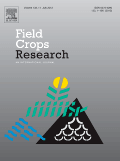
FIELD CROPS RESEARCH
Unlocking the Potential of Crop Production ResearchFIELD CROPS RESEARCH is a premier academic journal published by Elsevier, dedicated to advancing knowledge in the fields of Agronomy and Crop Science as well as Soil Science. Now in its 46th year of publication, this esteemed journal has established itself as a leading resource, holding a prestigious Q1 ranking in both the Agronomy and Soil Science categories, with a remarkable blend of rigorous peer-reviewed research and innovative findings. With a Scopus ranking of #27/406 in Agronomy and #20/159 in Soil Science, and a notable 93rd and 87th percentile respectively, FIELD CROPS RESEARCH plays a vital role in informing practices that drive sustainable agriculture and optimize crop production. Although not an open access journal, it remains highly accessible to the global research community and offers critical insights that influence policy and agricultural practices worldwide. Researchers, professionals, and students are encouraged to delve into this journal, as it continues to shape the future of field crop research through impactful studies and comprehensive reviews.

SOIL SCIENCE SOCIETY OF AMERICA JOURNAL
Exploring the Depths of Soil DynamicsWelcome to the SOIL SCIENCE SOCIETY OF AMERICA JOURNAL, a premier publication in the field of soil science, published by WILEY. With a distinguished history dating back to 1976, this journal has consistently provided a platform for researchers to share innovative findings and insights into soil’s critical role in agricultural and ecological systems. Featuring an impressive Q1 category ranking in Soil Science and positioned within the top 25% of its field according to Scopus, this journal is recognized for its impactful contributions to advancing our understanding of soil dynamics. While not an open-access journal, it remains a valuable resource for academics and professionals alike, with distinguished articles that meet the highest scientific standards. As it enters its converged years from 1976 to 2024, the journal aims to continue shaping the future of soil research, offering valuable knowledge to students, researchers, and practitioners dedicated to sustainable land management and environmental preservation.
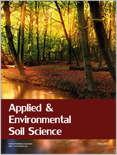
Applied and Environmental Soil Science
Fostering interdisciplinary dialogue for a healthier planet.Applied and Environmental Soil Science, an esteemed journal published by HINDAWI LTD, focuses on disseminating high-quality research in the fields of soil science and environmental applications. With an ISSN of 1687-7667 and an E-ISSN of 1687-7675, this open-access journal has been a vital resource for the academic community since its inception in 2009. As of 2023, it holds a commendable position in the Q2 category for both Earth-Surface Processes and Soil Science, highlighting its impact in these crucial disciplines. The journal’s rankings further affirm its significance within the field, being placed 61st in Earth and Planetary Sciences and 58th in Agricultural and Biological Sciences. Researchers and practitioners alike benefit from the collaborative platform it offers for sharing innovative studies essential for sustainable soil management and environmental integrity. With a focus on advancing knowledge and fostering interdisciplinary dialogue, Applied and Environmental Soil Science stands as a crucial pillar for scholars and professionals dedicated to addressing the pressing challenges of soil and environmental health.

Journal of Soil Science and Plant Nutrition
Exploring the vital connections between soil health and nutrition.The Journal of Soil Science and Plant Nutrition, published by SPRINGER INT PUBL AG, is a premier academic journal dedicated to advancing the fields of agronomy, plant science, and soil science. With an impressive Q1 ranking in both Agronomy and Crop Science and Plant Science, alongside a Q2 ranking in Soil Science, this journal stands at the forefront of innovative research and knowledge dissemination. Annually indexed in key databases, it provides a platform for high-quality research articles that explore the complex interactions between soil health and plant nutrition, contributing significantly to sustainable agricultural practices. Although it does not offer open access options, the journal is accessible through various academic institutions and libraries, ensuring a wide readership. With its emphasis on impactful findings, the journal is an essential resource for researchers, professionals, and students aiming to further their understanding and application of soil and plant science in an ever-evolving global context.

EURASIAN SOIL SCIENCE
Innovating solutions for soil conservation and management.EURASIAN SOIL SCIENCE, published by PLEIADES PUBLISHING INC, is a premier journal dedicated to advancing knowledge in the fields of soil science and earth-surface processes. With an ISSN of 1064-2293 and an E-ISSN of 1556-195X, this journal has been a key resource for researchers and professionals from its inception in 1992 and continues to thrive as it converges toward 2024. Situated in the United States, EURASIAN SOIL SCIENCE has achieved notable recognition, attaining a Q2 ranking in both Earth-Surface Processes and Soil Science categories as of 2023. Its Scopus rankings further underscore its importance, with Earth and Planetary Sciences placing it at #81/179 and Agricultural and Biological Sciences ranking it at #80/159. Engaging a global audience, this journal publishes cutting-edge research articles, reviews, and case studies that address critical issues related to soil health, conservation, and management. Though currently not open access, the journal offers valuable insights and fosters collaboration among scientists and practitioners, underscoring its vital role in enhancing the understanding of soil dynamics and sustainability.
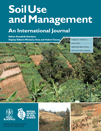
SOIL USE AND MANAGEMENT
Empowering the future of soil use and management.SOIL USE AND MANAGEMENT is a premier academic journal published by Wiley, focusing on the critical domains of Agronomy, Crop Science, Pollution, and Soil Science. With an ISSN of 0266-0032 and an E-ISSN of 1475-2743, the journal has established itself as a vital resource in the field since its inception in 1985. Operating from its U.S. headquarters in Hoboken, NJ, SOIL USE AND MANAGEMENT boasts impressive Q1 rankings across its relevant categories, indicating its standing in the top tier of research journals. Notably, it is ranked 48th out of 406 journals in Agronomy and Crop Science and holds an 88th percentile position, as well as a commendable rank of 26th out of 159 journals in Soil Science, underscoring its influence and reach. This journal serves as an essential platform for researchers, professionals, and students dedicated to sustainable soil management practices and understanding soil's role in agricultural productivity and environmental health. Although it does not offer Open Access, its rigorous peer-review process ensures the publication of high-quality original research, reviews, and case studies critical for advancing knowledge and practice in the field. This journal is crucial for anyone engaged in soil science and its related disciplines, encouraging innovative approaches to challenges facing soil use and management today.

AGROCHIMICA
Advancing agricultural knowledge for a sustainable future.AGROCHIMICA is an eminent journal published by PISA UNIV PRESS, dedicated to advancing the fields of Agronomy, Crop Science, Food Science, and Soil Science. With a rich history dating back to its inception in 1973, this journal has evolved through various phases of publication, illustrating its commitment to delivering quality research over several decades. Although currently categorized in the Q4 quartile across its respective disciplines, AGROCHIMICA provides a platform for foundational and innovative studies that contribute to knowledge in agricultural practices and sustainable food systems. While the journal is not open access, it remains a valuable resource for researchers, professionals, and students interested in Italy's and the global agricultural landscape, fostering a greater understanding of the complexities within these interconnected fields. The ISSN associated with this journal is 0002-1857, and it is published from Pisa, Italy, addressing the evolving challenges in agriculture with a spotlight on rigorous scientific inquiry.

Romanian Agricultural Research
Elevating Agricultural Insights for Tomorrow's ChallengesRomanian Agricultural Research is a prominent academic journal dedicated to advancing the field of agricultural science with a specific focus on agronomy and crop management. Published by the NATL AGRICULTURAL RESEARCH & DEVELOPMENT INST in Romania, this journal has established itself as an important resource within its discipline, evidenced by its Q3 ranking in the Agronomy and Crop Science category for 2023. With its ongoing publication since 2008, the journal provides a platform for researchers and professionals to disseminate their findings and share innovative practices that address the challenges faced in agricultural development. Although it operates under a non-open access model, Romanian Agricultural Research commits to rigorous peer-review processes, ensuring the high-quality content that enhances the academic community’s knowledge base. The journal's objective is to foster dialogues surrounding sustainable agriculture, improve crop yield, and contribute to the enhancement of agricultural practices globally. Researchers, professionals, and students will find this journal to be an invaluable repository of knowledge and a catalyst for future agricultural innovations.